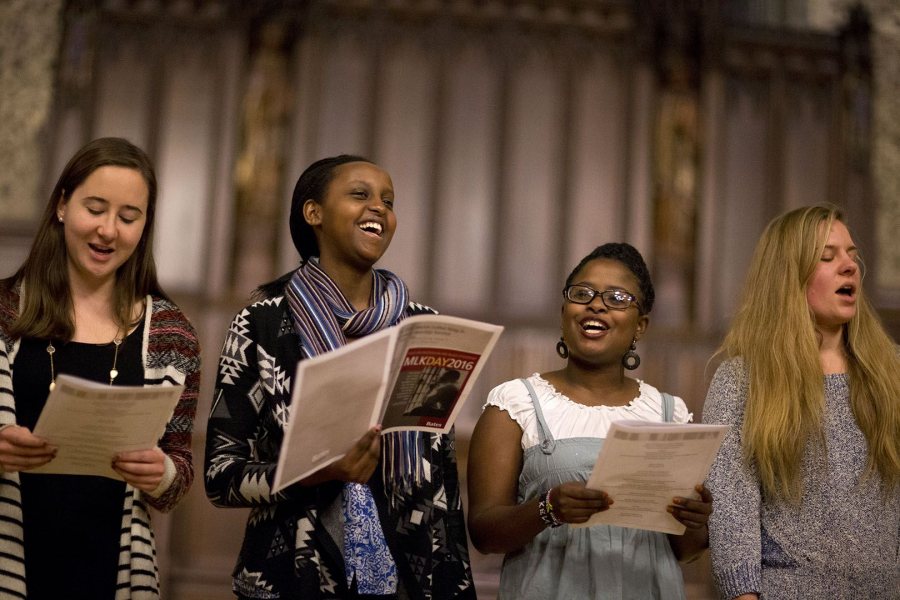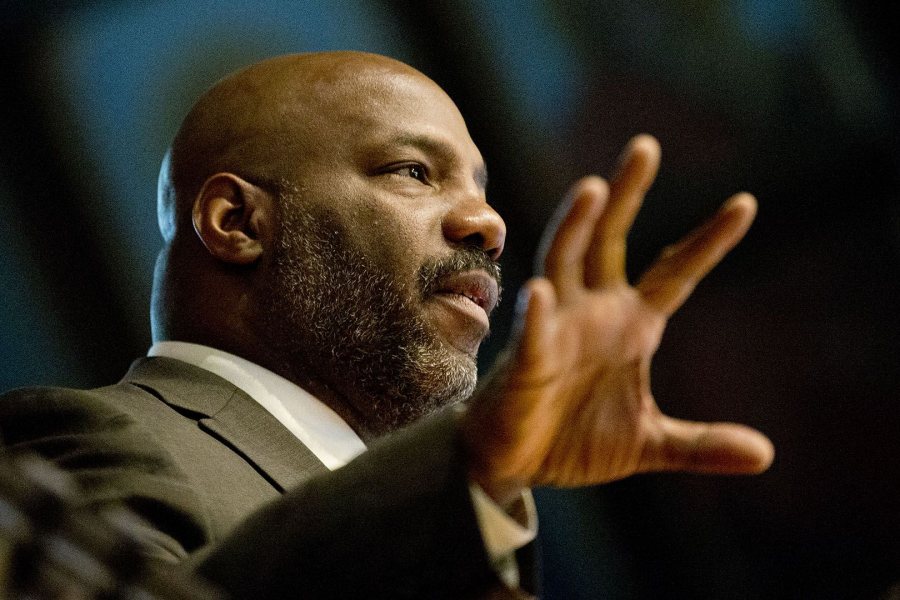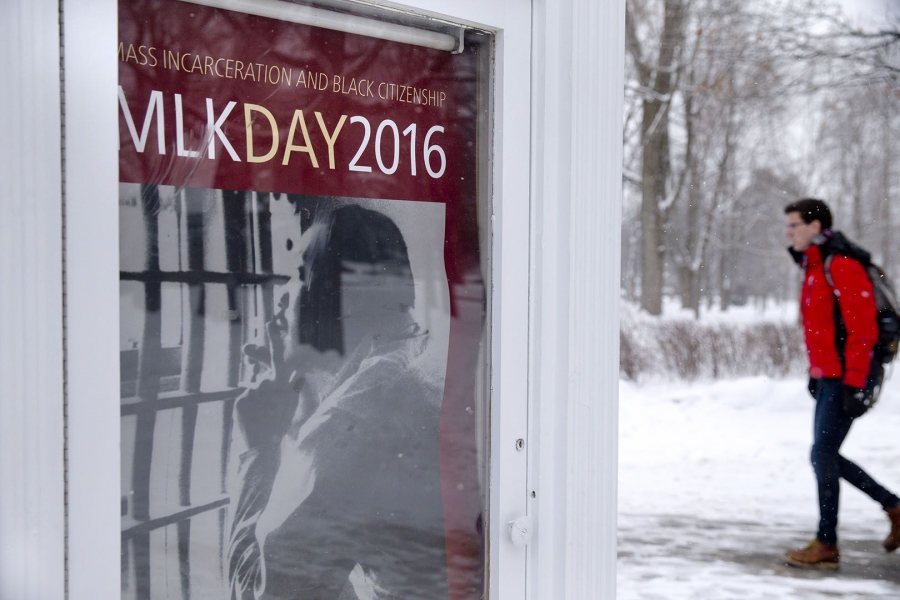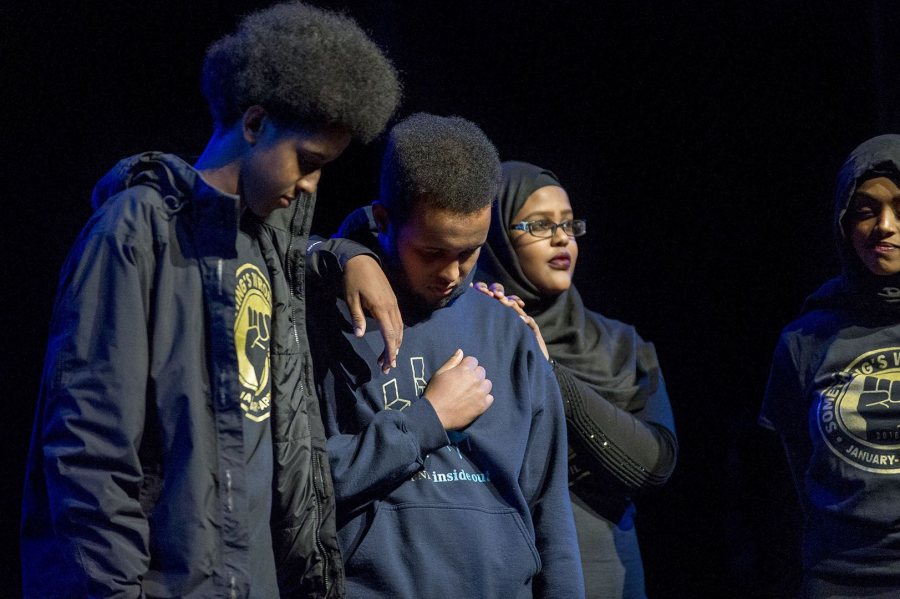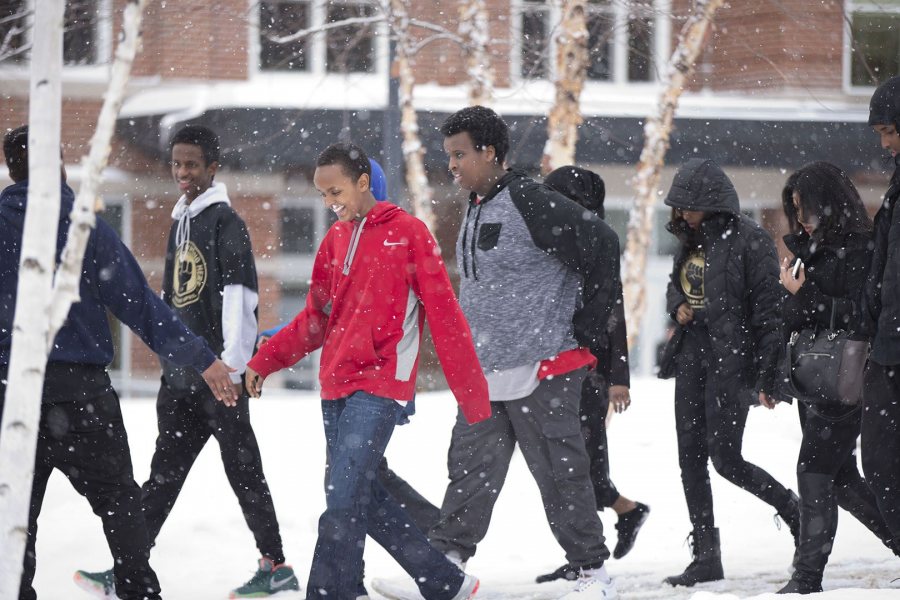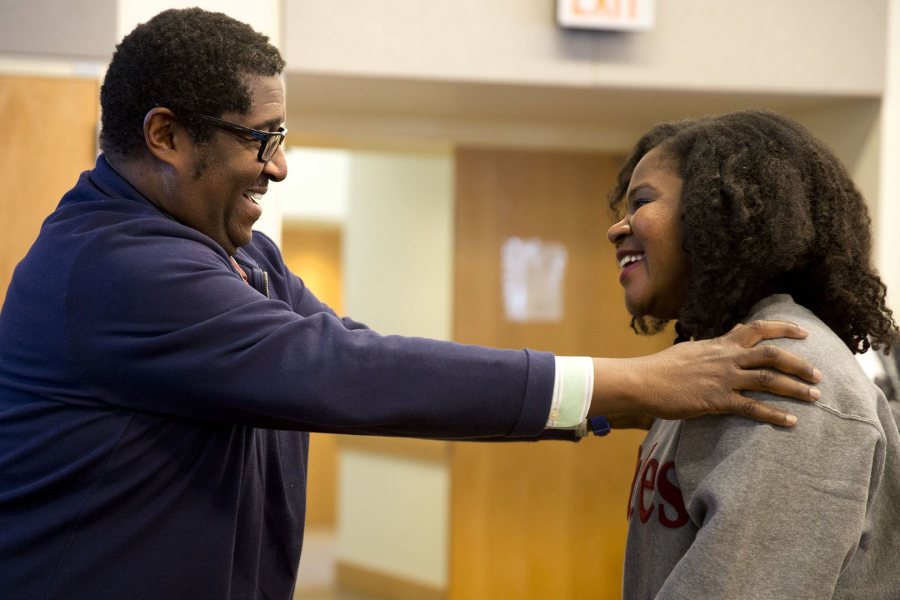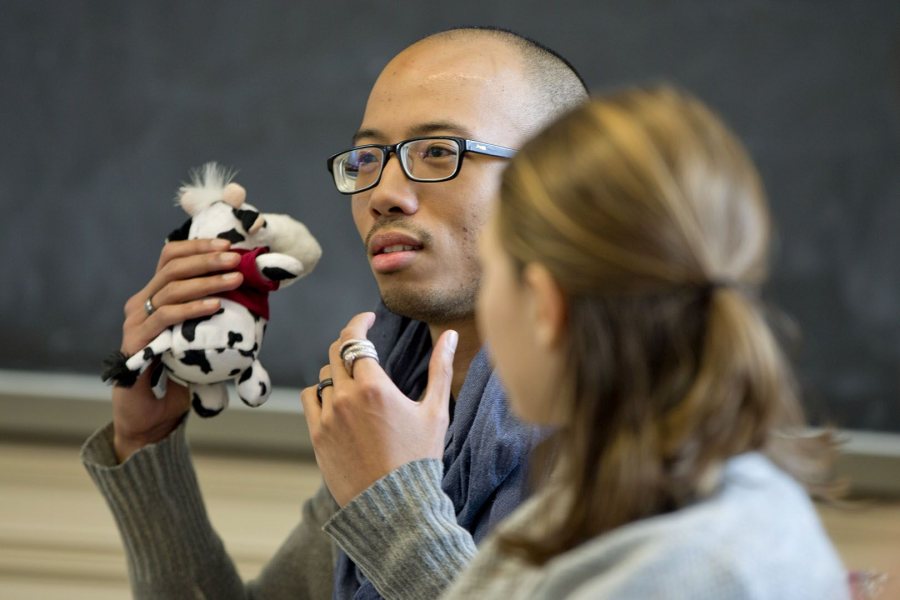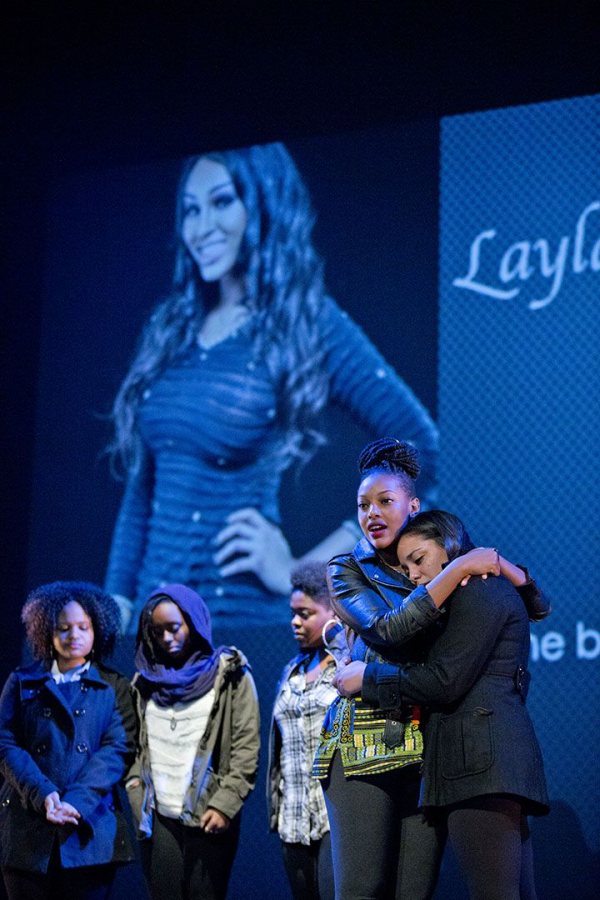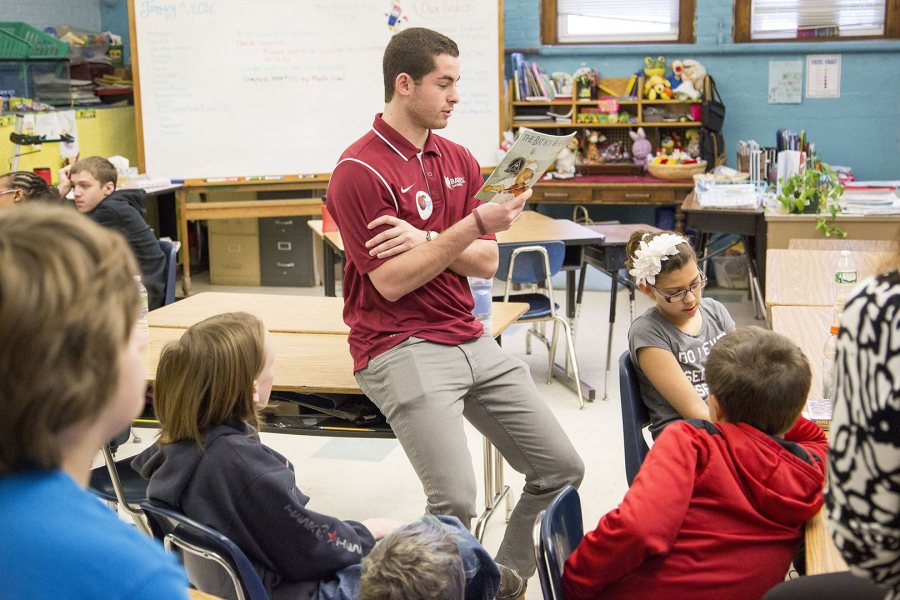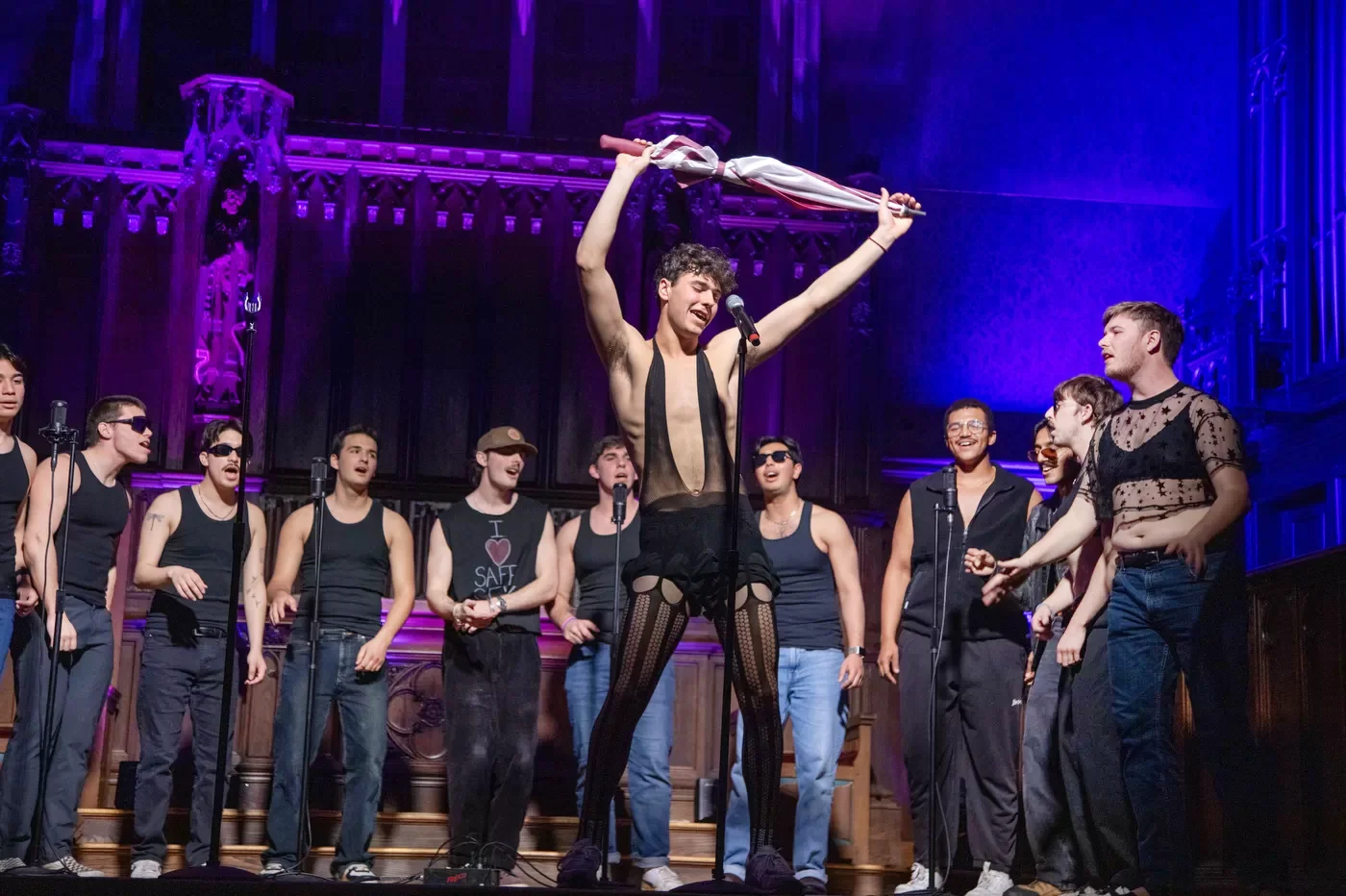
Hour by hour, MLK Day pictures, quotes, readings, ideas, and gestures
Here’s how MLK Day 2016 looked — what was said and read, and what was acted, sung, and pondered — as the campus community and invited guests from near and far came together to work on the theme “Mass Incarceration and Black Citizenship.”
7:02 p.m., Jan. 17
The college’s MLK observance began with Sunday evening’s traditional MLK Memorial Worship Service in Gomes Chapel, which encompassed dance, music, and spoken word. The homily was delivered by the Rev. Peter Paris, author and professor emeritus of Christian social ethics at Princeton Theological Seminary.
8:20 a.m., Jan. 18
The day got an early start. Chris Petrella ’06, a doctoral candidate at the University of California, Berkeley, and Assistant Professor of Sociology Michael Rocque gave the day’s events and theme, “Mass Incarceration and Black Citizenship,” a solid foundation by presenting a whirlwind survey of pertinent issues.
Among the staggering facts and figures:
- By the end of 2014, nearly seven million Americans were subject to some sort of correctional supervision.
- The U.S. incarceration rate is the world’s highest. According to the Prison Policy Initiative, for every 100,000 people, the U.S. has 716 behind bars; the United Kingdom, 147; Canada, 118; and Norway, 72.
- From 1974 to 2014, the incarceration rate has skyrocketed — increasing fivefold.
- Convictions for drug offenses drove the increase. In 1980, federal prisons held some 4,700 individuals for drug offenses. In 2014, the number was 96,500.
- Racial disparities in imprisonment rates are striking. Just one white American out of 17 is likely to be imprisoned, while the rate is far higher among Latino men (one in six) and black men (one in three).
- One in 117 white women will be imprisoned vs. one in 45 Latina women and one in 18 black women.
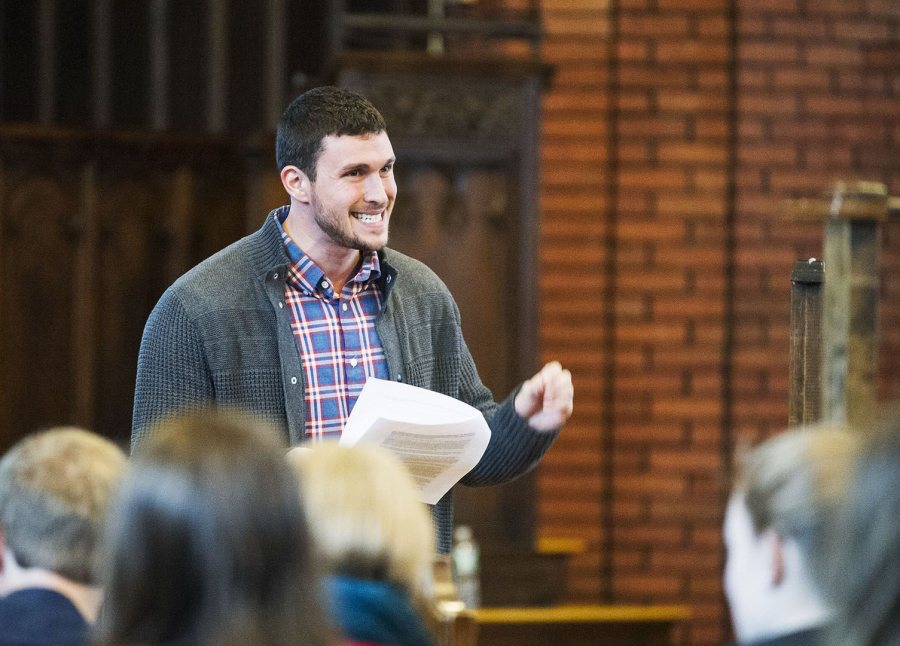
In Gomes Chapel, just before the MLK Day keynote, Christopher Petrella ’06 discusses issues surrounding imprisonment. (Josh Kuckens/Bates College)
8:55 a.m., Jan. 18
The MLK keynote session started with remarks by President Clayton Spencer:
Particularly relevant to our topic today, Michelle Alexander argues in The New Jim Crow that the mass incarceration of young men of color, initiated by the war on drugs and carried through to the jaw-dropping incarceration rates of today, is simply the latest move in a highly adaptive system of racial exclusion that extends back to the earliest history of the nation….
We have to ask ourselves: At Bates, even with our storied history — no, especially with our storied history — in what ways do our very own culture, structures, unthinking ways, and even conscious ways marginalize students and others of color whom we invite to be here and promise full participation?
And what are we going to do about it?
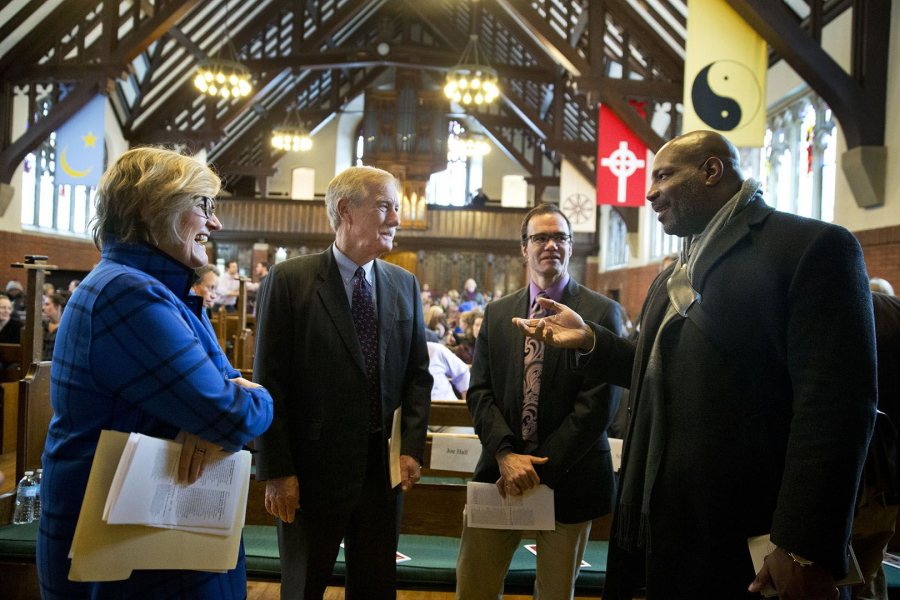
From left, President Clayton Spencer, U.S. Sen. Angus King, I-Maine, Associate Professor of History Joe Hall, and MLK Day keynote speaker Jelani Cobb. (Phyllis Graber Jensen/Bates College)
9:21 a.m., Jan. 18
In his remarks, U.S. Sen. Angus King recalled the 1963 March on Washington:
Fifty-two years ago, Americans marched to Washington’s great National Mall. … Those people came to Washington drawn by a radical idea — an idea that’s at the heart of the American experience, an idea that was new to the world in 1776, tested in 1865, renewed in 1963, and an idea still new and radical today in much of the world.
That idea is that all men and women are created equal.
Fifty-two years ago at that sacred place, Americans sent a message to their leaders and to the world: that the promise of equality of opportunity, equality before the law, equality of the right to freely participate in the benefits and responsibilities of citizenship, apply to everyone in a country, not just the lucky few of the right color or accident of birth.
This is what Martin Luther King meant when he said that his dream was deeply rooted in the American dream.
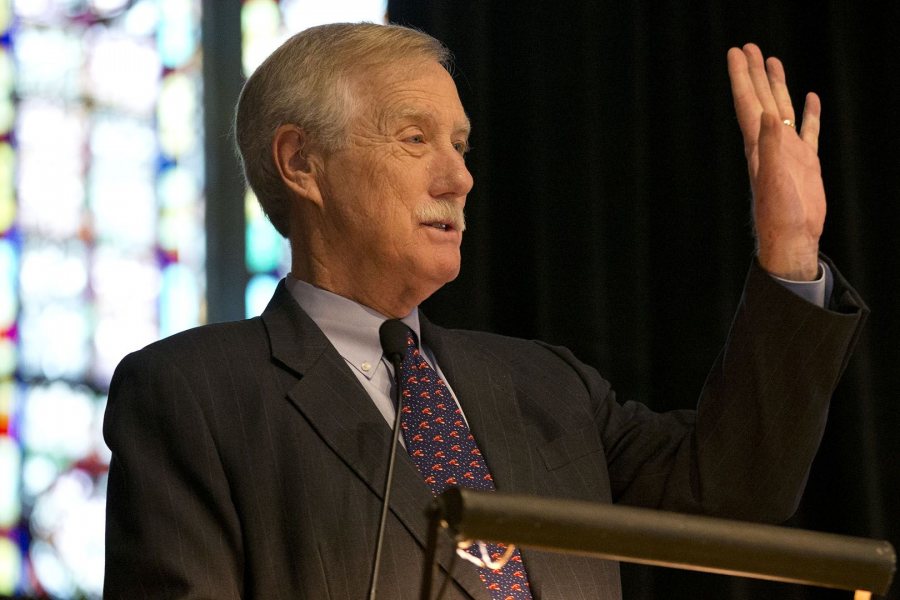
U.S. Sen. Angus King speaks during the college’s MLK Day gathering in the Gomes Chapel. (Phyllis Graber Jensen/Bates College)
9:41 a.m., Jan. 18
In his keynote, Jelani Cobb includes an acutely personal example of racial double standards.
“I’m old enough to remember the scourge of heroin when it first emerged and was largely considered a drug problem among black and brown people,” he said. Cobb’s oldest brother became addicted to heroin while serving in Vietnam and died of an HIV infection contracted while he was using heroin.
The surge of heroin use among people of color was, in part, “the basis for the beginning of the ‘War on Drugs’ and the mass incarceration that has accompanied it,” Cobb said.
Today’s conversation about heroin use is “staggeringly different.”
Cobb compared that era with recent comments from New Jersey Gov. Chris Christie. “He spoke movingly about ways in which drug abuse has ruined families and the ways in which it’s a cause for all of our sympathies and concerns.”
Hearing Christie’s remarks, Cobb noticed that today’s conversation about heroin use is “staggeringly different.” Now that heroin is a crisis “among young white people,” Cobb said, it’s curious that Christie did not say that “we should respond to this problem by locking more people up.”
10:30 a.m., Jan. 18
The key question during a panel on “Global Accounts of State Violence and Identity” came from a student, and it came after we’d heard three senior anthropology majors talk about their thesis fieldwork, which, in each case, had brought them face to face with victims of trauma or physical violence.
The question: What’s it like to ask people questions about their grief, trauma, and pain? The answer, each senior said, is to focus on the person’s humanity.
Create spaces that allow kindness.
“You respond to the people as if one of your close friends had shared something difficult,” said Detmer Kremer of Nij Beets, Netherlands, who shared findings about the anti-refugee movement in the Netherlands and religious exclusion in Samoa.
“You provide opportunities to stop the interview, to halt the process, to create spaces that allow kindness to be part of the process.”
He was joined by Ashley Bryant of Medfield, Mass., who talked about anti-Muslim sentiment in American public schools, and Carly Peruccio of Manchester, Conn., who described women’s experiences during Morocco’s era of state-sponsored violence against dissidents, the “Years of Lead,” from the 1960s to 1980s.
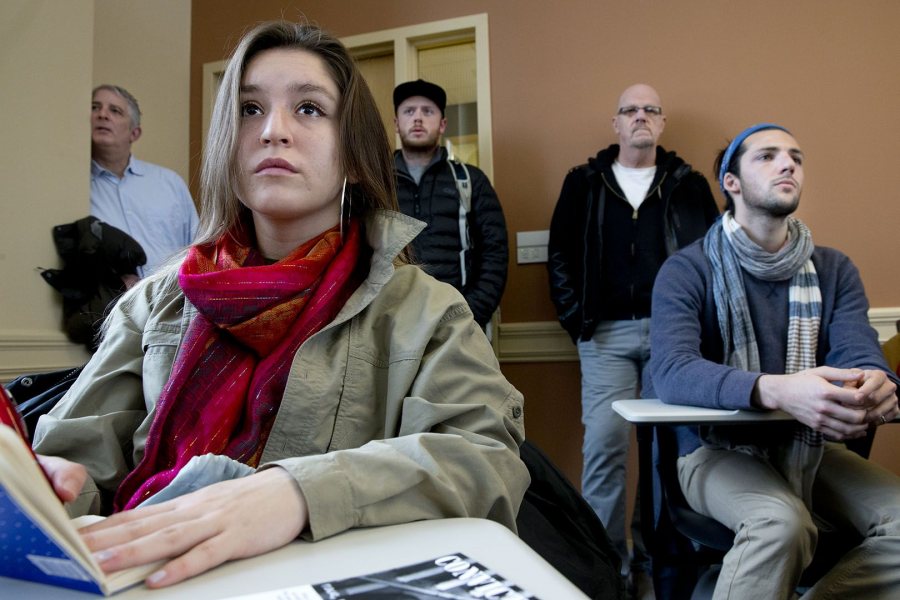
A student listens to the panel discussion on “Global Accounts of State Violence and Identity.” (Phyllis Graber Jensen)
10:31 a.m., Jan. 18
A poster in the “mouthpiece” display case announces the MLK Day theme.
11:37 a.m. Jan. 18
“We are trying to make a change but we are the minority. We need you to pitch in as a community for the future generations. Whether you know it or not, you have the power to change the world, to make it safer for us people of color.”
With that statement, actor Mouamed M. broke the fourth wall in Schaeffer Theatre during the premiere of Something’s Wrong Here, a play written and performed by two youth groups, Maine Inside Out and the MLK Fellows.
A shift to “accountability and connection.”
Co-founded by Margot Fine ’03, Maine Inside Out collaborates with incarcerated and formerly incarcerated people to create and share original theater. The Maine Inside Out cast members of Something’s Wrong Here comprised current and former residents of the Long Creek Youth Development Center in South Portland.
“The goal is to shift from our current culture of punishment and isolation to one of accountability and connection,” explained Fine.
The MLK Fellows, sponsored by a Portland-based youth development program, contributed to the play by punctuating several scenes with original poetry, which elicited a cacophony of appreciative snaps from audience members, and reciting statistics on poverty levels, literacy rates, and the growing number of incarcerated people of color in Maine.
11:39 a.m., Jan. 18
Visitors from high schools along with participants in MLK Day events walk toward Commons for lunch.
12:03 p.m., Jan. 18
A selection of images from workshops that brought Bates people and guests together for discussion and thought:
- “Race, Gender, Sexuality, and the Criminalization of HIV/AIDS,” led by Professor of Rhetoric Charles Nero;
- “Power and Complacency in American Incarceration and Our Community,” led by the Stringfellow Coordinators of the Multifaith Chaplaincy;
- “International Criminal Court: A Step Toward Global Justice?” led by the Africana Club;
- “Should Environmentalists Also Be Prison Abolitionists?” led by environmental studies lecturer Ethan Miller ’00.
1:24 p.m. Jan. 18
Each MLK Day, several faculty, students, and staff read from texts that have inspired them. Here are brief video excerpts from six readings, in this order:
Jeremy Glover ’17 of Cleveland Heights, Ohio, reading from King’s speech at Glenville High School in Cleveland on April 26, 1967. “My mother was in attendance,” Glover said, “so it has a special importance in my life.”
Helene Sudac ’19 of Lake Forest, Ill., reading from “A Letter to My Nephew,” by James Baldwin (1962).
Caleb Perlman ’19 of Carlisle, Mass., reading from Living Buddha, Living Christ, by Thich Nhat Hahn (1995).
Joseph Hall, associate professor of history, reading from Eulogy on King Philip, by William Apes (1836).
Jessica Perez, assistant dean in Student Affairs, reading from The Next American Revolution, by Grace Lee Boggs (2011).
Jamil Drake, visiting assistant professor of religious studies, reading from King’s speech “Beyond Vietnam,” delivered at New York City’s Riverside Church on April 4, 1967.
2:40 p.m., Jan. 18
At an MLK Day workshop exploring how Bates is adopting principles and practices of restorative justice, there was no shame in holding a stuffed cow called Stuart while you spoke.
In fact, sans Stuart, you didn’t speak. Under the rules of a “restorative circle” exercise, you spoke only when the cow came to you. Otherwise, you practiced active listening.
The group put the concept into practice during the session by talking about the racial discrimination protests at U.S. colleges and universities.
Leading the exercise were Robert Ibarra ’17 of Los Angeles and Katie Stevenson ’17 of Ewing, N.J. They get plenty of practice: as Mediation and Restorative Justice Fellows in the Student Life office, they have been leading restorative circles and related exercises around campus this year.
Their hope is to teach the Bates community that responding to student misconduct can focus on redressing harm rather than on punishment.
“Trust the circle.”
The other workshop leaders, Carl Steidel of the Student Affairs office and psychology professor Georgia Nigro, are establishing restorative justice as an alternative approach in student conduct proceedings.
The circular discussion and “talking piece,” aka Stuart, are key. They enable “people to get to the stuff that they need to get to,” Steidel said. “Trust the circle.”
4:03 p.m., Jan. 18
This year’s traditional Benjamin Mays Debate gave student debaters from Bates and Morehouse a chance to argue the value of police reform vs. prison reform.
Morehouse sophomore Best Uchehara supported the Government position, in favor of police reform:
“Ethnic minorities of America have been robbed of justice. Beaten mercilessly at the hands of law enforcement officials who are supposed to be just. Burdened by frequent targeting and racial profiling. Berated, with an unjust reality that lies contrary to what is promised in the Constitution. We, on the side of the Government, believe that enough is enough. We need reform.”
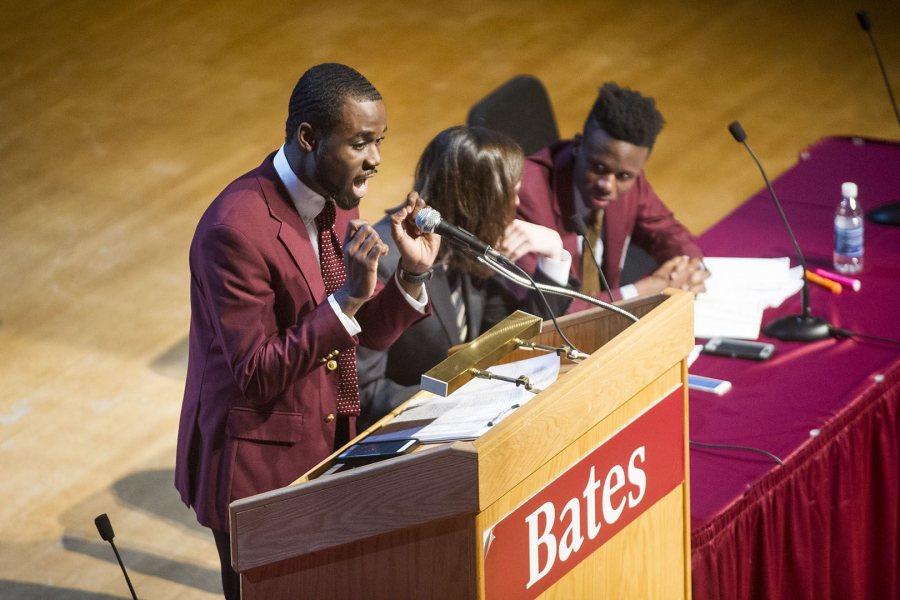
Morehouse College sophomore debater Best Uchehara argues for police reform. (Josh Kuckens/Bates College)
4:25 p.m., Jan. 18
Michael Stone ’17 of Litchfield, N.H., and Keith Matier, a sophomore at Morehouse College, argued for prison reform.
Police are merely “gatekeepers” of the criminal justice system, said Stone. Solving mass incarceration means rehabilitating prisoners and reducing the stigma they face when they return to society. Ultimately, reform would mean lower poverty rates and greater employment.
Without reform, said Matier, being imprisoned will continue to create less-productive Americans. “When I see a prison…I say, ‘That is a place I do not want to go because I’m going to be relegated to social, economic, and political inferiority.”
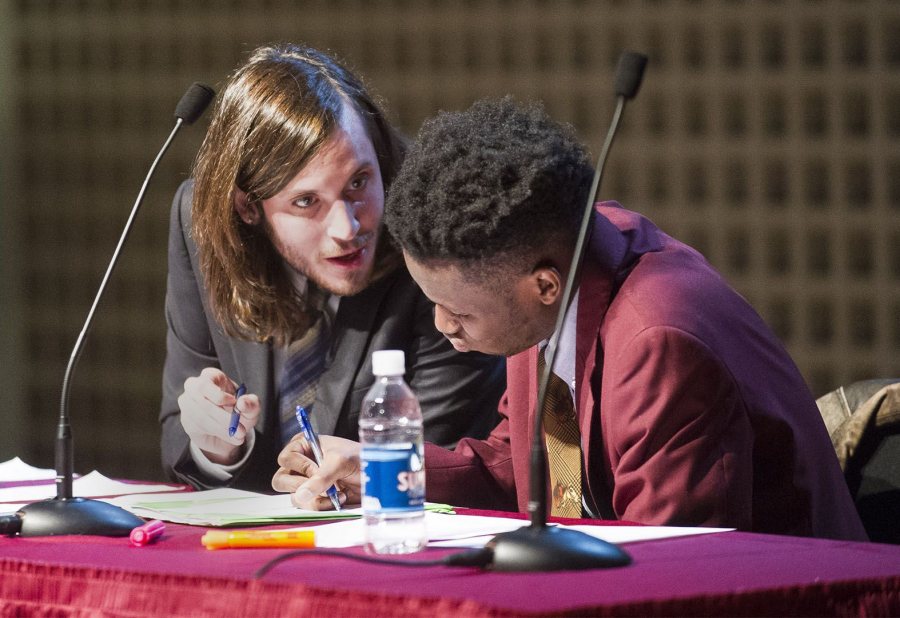
Michael Stone ’17 of Litchfield, N.H., and Keith Matier, a sophomore at Morehouse College, discuss strategy to counter the Government’s position. (Josh Kuckens/Bates College)
7:38 p.m., Jan. 18
An annual expression of pride and accomplishment for members of the African diaspora at Bates, this year’s edition of Sankofa on MLK Day shared experiences of Afro-women internationally, linked by the theme of storytelling and friendship.
1:48 p.m., Jan. 19
The day after MLK Day, Adam Blau ’18 of Pacific Palisades, Calif., and James Reese, longtime dean in Student Affairs who is a founder of the college’s MLK Day tradition, were among volunteers who read to Lewiston schoolchildren at the Martel School during the annual MLK Read-In.
Reporting by Leanne Ouimet, Doug Hubley, and Jay Burns.
